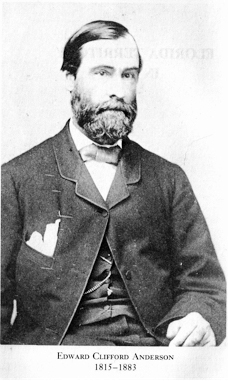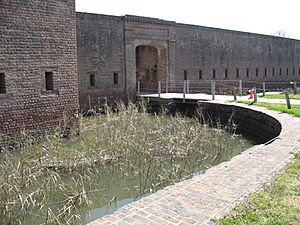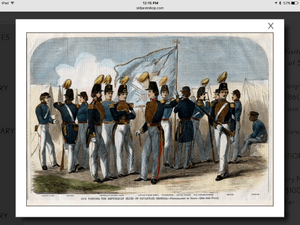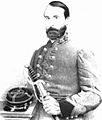Edward Clifford Anderson facts for kids
Quick facts for kids
Edward Clifford Anderson
|
|
|---|---|
 |
|
| Born | November 8, 1815 Savannah, Georgia |
| Died | January 6, 1883 (aged 67) Savannah, Georgia |
| Place of burial |
Laurel Grove Cemetery, Savannah, Georgia
|
| Allegiance | |
| Service/ |
|
| Years of service | 1834–1850 (USA) 1861–1865 (CSA) |
| Rank | Union Navy Lieutenant (USA) Confederate Army Colonel |
| Commands held | City of Charleston Old Fort Jackson Mayor of Savannah 1854–1856 1865–1869 1873–1877 |
| Battles/wars | American Civil War
|
| Other work | U.S. Army Officer, Confederate Army Officer, Mayor of Savannah |
Edward Clifford Anderson Sr. (born November 8, 1815 – died January 6, 1883) was an important person from Savannah, Georgia. He was a naval officer in the United States Navy. Later, he became a Colonel in the Confederate States Army during the American Civil War. He also served many times as the Mayor of Savannah, both before and after the war. He was the first mayor elected after the war ended in 1865.
Contents
Edward Clifford Anderson was born in Savannah, Georgia. He was one of many children of George and Eliza Anderson. His grandfather, Captain George Anderson, fought in the American Revolutionary War. Edward grew up near the docks and dreamed of becoming a famous naval officer.
He went to school in Massachusetts from 1824 to 1830. In 1833, he joined the U.S. Navy as a midshipman. He served on ships like the USS St. Louis and the famous USS Constitution. He kept a diary during his time at sea. This diary recorded his life and adventures. He sailed to many places, including Newfoundland, South America, Europe, and the Caribbean Sea. In 1840, he was promoted to acting master.
In 1841, he married Sarah McQueen Williamson. They had two children, Mary and Edward Maffitt. He continued his naval service. His diary was later published as a book.
Fighting in the Mexican-American War
In 1846, Anderson served on the USS Mississippi. This ship was the main vessel for the West Indian Squadron. He served under Commodore Matthew C. Perry. During the Mexican–American War, he helped capture several Mexican coastal towns. These actions helped the U.S. control the Mexican coastline.
In 1847, he was promoted to lieutenant. His ship, the Mississippi, helped capture Veracruz. They supplied guns and men for the fight. After the war, Anderson worked for the Coast Survey Department. He left the Navy in 1849 after 15 years. He then returned to Savannah. He became a respected citizen, involved in farming, money matters, and politics. He was first elected Mayor of Savannah in 1854.
Role in the Civil War
When the American Civil War began, Anderson helped the state of Georgia. He bought weapons from a factory in Richmond. Soon after, Jefferson Davis, the President of the Confederacy, made him a Major. Anderson was sent to Europe as a secret agent. His job was to buy war supplies for the Confederacy. He also helped arrange for these supplies to get past the Union blockade using blockade runners.
In England, he worked with James D. Bulloch. They bought warships and supplies for the South. They even raised a Confederate flag in Liverpool after a Southern victory. Their success helped other British companies start blockade-running. In 1861, Anderson returned home with much-needed weapons. He was promoted and became "Commander of the River Batteries." He was in charge of river defenses in Savannah. This included commanding Fort James Jackson.
Fort James Jackson was built between 1808 and 1812. It was located on the Savannah River. It was one of three forts protecting Savannah during the Civil War. The other forts were Fort Pulaski and Fort McAllister. Fort McAllister was captured by General William Tecumseh Sherman's forces in December 1864. This loss allowed Sherman to reach the sea. It also helped him resupply his army. This led to the surrender of Savannah.
Anderson was known for his knowledge of artillery. During Sherman's March to the Sea, Anderson led the evacuation of Savannah. He was then put in charge of Charleston, South Carolina. He helped plan the evacuation of that city too.
After the war, Anderson was elected mayor of Savannah again. This happened on December 6, 1865. He was the first mayor elected after the war ended.
Politics and Public Service
Anderson's third term as mayor began in October 1865. Savannah faced many challenges during the Reconstruction Era. There was even a cholera outbreak. Mayor Anderson personally helped many people. He used his own money for charity. He also raised taxes to improve the police force. His nephew, General Robert H. Anderson, led the police.
He worked to fix the city market, jail, streets, and sewers. In 1866, the Savannah Board of Education was started. This board helped educate the city's children. Anderson also focused on business and trade. He worked to clear the river for ships. He also helped expand the docks and finish the Georgia Central Railroad.
Anderson held a "Mayor's Court" every day. He heard cases about public problems like theft and disturbances. His good leadership helped the city recover from the war. He did not run for re-election at the end of this term. He later served on the boards of several banks and railroads. He even met with President Ulysses S. Grant and General William Tecumseh Sherman. He tried to help Georgia during a difficult political time.
Anderson was later convinced to run for mayor again. He won his seventh election in 1873. The local newspaper called him "one of Savannah's most useful and honored citizens." During this term, he helped the city pay off its debts. He also worked with the U.S. Government to improve the Savannah River channel. He expanded telegraph lines too. His focus on business helped him win another term in 1875.
In 1877, Anderson decided not to run for mayor again. He was 62 years old. His health slowly declined. But he remained active in civic groups. He led the Savannah Board of Education. He was also part of the Georgia Historical Society. Even former enemies, like General William Tecumseh Sherman, respected him. Sherman recommended Anderson for Secretary of the Navy in 1881.
Edward Clifford Anderson died on January 6, 1883, at age 67. The Savannah Morning News wrote a long obituary. It praised his career in both the U.S. Navy and the Confederate Army. He was buried in Savannah's Laurel Grove Cemetery.
Images for kids
 | James Van Der Zee |
 | Alma Thomas |
 | Ellis Wilson |
 | Margaret Taylor-Burroughs |















